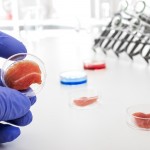Some people adamantly refuse to eat processed foods like hot dogs and McDonald s fare for many reasons. But what would people say to in vitro -- or lab-grown -- meat?
In 2013, Professor Mark Post and a Dutch team of scientists developed the first lab-grown burger. Made from a cow s stem cells, the burger cost over $300,000 to make (now that's a whopper), and early last year Post s team predicted that the burger would hit menus by 2020. At a price of $36 per pound, or $11 per burger, it would be considered a specialty product for the masses.
Once we can grow the tissue in a reactor the size of an Olympic swimming pool, we should be able to achieve that sort of volume, Post said last May in an interview with the Washington Post. For perspective, half a swimming pool would allow us to feed about 20,000 people for a year.
As the demand for meat grows exponentially and millions of people go hungry each day, in vitro meat such as Post s seems like a scientific blessing. But many people are hesitant to accept it, for a number of reasons.
First, many criticize the cost of producing lab-grown meat. They say that expensive production processes like Post s simply aren t economically viable. Yet this criticism fails to consider the money saved in natural resources by avoiding factory farming. The expenses of raising and slaughtering cattle, then packaging and processing the meat, are very high. In comparison, the only natural resources required for the in vitro burger were the calories and nutrients for the muscle.
Critics also cite the unnatural quality of lab-grown meat. People may be reluctant to buy in vitro meat simply because it s not natural. Yet these same people must not eat cheese or yogurt, because biotechnology is involved in nearly all production of both.
Others say in vitro meat may carry risky health consequences. On the contrary, the FDA has yet to conduct clinical trials to prove or disprove these health concerns. Also, products like the in vitro burger may actually be a healthier option than conventional meat. Research shows that regular consumption of natural meat products may lead to heart disease, diabetes and certain cancers. So we may find that in vitro meat may ultimately be healthier.
We gain greater control over what the meat consists of, for example its fat content, Post told The Atlantic. And the reduction in the number of farmed animals reduces the chance of zoonosis [infectious diseases spread by animals].
Studies have also shown that the burger may be environmentally beneficial. Peter Verstrate, the food technician for Post s team, told the website Laboratory Equipment that lab-grown meat would eliminate methane produced from cattle, leading to much lower world CO2 emissions.
A 2011 Oxford University study also claims that lab-grown meat would generate 96 percent lower greenhouse gas emissions than conventionally produced meat.
Simply put, cultured meat is, potentially, a much more efficient and environmentally friendly way of putting meat on the table, said Hanna Tuomosito, the leader of the research, in an interview with Laboratory Equipment.
